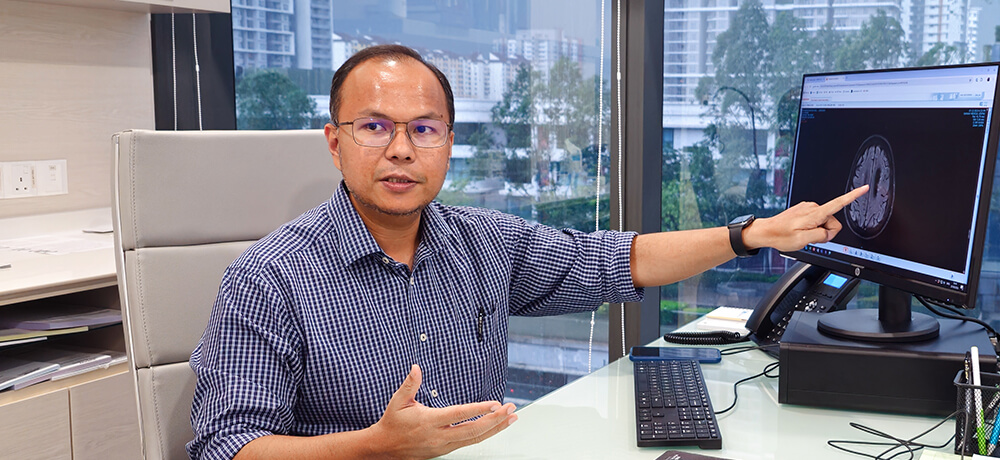Understanding the Link Between Stroke and Dementia with Dr Mohamad Imran
24 December 2024
(1).jpg)
Chances are, you know someone who has experienced a stroke or has a loved one who has.
Strokes are alarmingly common, often leading to death or disability that profoundly impacts both individuals and their loved ones. According to the World Health Organization, stroke is the second-leading cause of death globally and the third-leading cause of both death and disability combined.
But that’s not all—did you know that experiencing a stroke can significantly increase your risk of developing dementia?
In this article, Dr Mohamad Imran Bin Idris, our Consultant Neurologist, sheds light on the connection between stroke and dementia, as well as practical steps you can take to reduce your risk of developing both.
Understanding Stroke and Dementia
Stroke and dementia are two of the most prevalent neurological conditions.
A stroke is caused by a blockage of blood flow to the brain or when a blood vessel in the brain ruptures. The lack of adequate blood supply, according to Dr Mohamad Imran, leads to death of brain cells, even if it is only for a short period of time.
This can result in death or permanent brain damage affecting body functions, depending on the stroke's severity.
This is why it is absolutely crucial to get to the hospital as soon as you can if you notice these signs of a stroke:
- Numbness and weakness in face or limbs
- Slurring of speech
- Trouble with balance and coordination
- Blurred or double vision
Dementia, on the other hand, is a decline of brain function, characterised by symptoms such as memory loss, difficulties with thinking and reasoning, as well as changes in mood and behaviour.
How Does Stroke Cause Dementia?
Many people do not realise that every moment after a stroke, there is extensive damage to the brain tissue.
“Every minute after a stroke, you lose 2 million neurons (brain cells). By the time the ambulance comes to pick up the person who had a stroke—best case scenario, in 5 minutes—that would be 10 million neurons” reveals Dr Mohamad Imran.
This brain damage, he explains, is how individuals who have had a stroke develop not only weakness and numbness, but also cognitive impairment affecting memory, language and ability to process information.
“To give you an idea of the magnitude of the problem—about 60 percent of people will develop post-stroke cognitive impairment (PSCI) within the first year of the stroke, which can range from mild, moderate or severe,” he explained.
By definition, dementia is considered a form of cognitive impairment. According to Dr Mohamad Imran, if the cognitive impairment is severe enough to significantly affect your daily life, it is already considered dementia.
Signs of Dementia Caused by Stroke
Dementia that occurs following a stroke is called vascular dementia. Dr Mohamad Imran explains that this form of dementia often remains static initially, as it is caused by the initial event.
Symptoms of stroke-related dementia may include the following:
- Memory impairment
- Slowed thinking
- Problems concentrating
- Difficulty with executive functioning (planning, organising and making decisions)
- Changes in mood
However, he warns that with time, individuals with vascular dementia will continue to deteriorate, due to their mental faculties not functioning at a high enough level for a long period of time.
How to Treat or Prevent Stroke-Related Dementia

How then can individuals reduce their risk of developing vascular dementia after a stroke?
Dr Mohamad Imran emphasises that the single most important step is controlling stroke risk factors to prevent another stroke.This includes managing their blood pressure, blood sugar and cholesterol levels, as well as taking prescribed blood-thinner medications.
Additionally, rehabilitation physiotherapy and occupational therapy are essential—particularly cognitive rehabilitation, which is often overlooked.
“There’s a lot of awareness about the physical aftereffects of a stroke, but less so on the cognitive side,” he says.
He explains that a neurologist plays a critical role in looking at the broader picture, going beyond just the physical recovery of the stroke patient. A neurologist can identify post-stroke cognitive impairment through tests, and educate patients and their caregivers about the potential signs of post-stroke cognitive impairment, which may not be immediately obvious to the general public.
“Some people may say they’re perfectly fine, but then when I ask them why they aren't back at work, they’ll say, ‘I have become very slow; I cannot process information quickly enough.’ That’s one aspect of cognitive impairment that’s well known to be linked with vascular dementia,” explains Dr Mohamad Imran.
By recognising these issues early, he says, neurologists can initiate steps to help prevent further deterioration, such as referring patients to occupational therapists for coping strategies or a clinical psychologist for assessment.
Empowering Cognitive Recovery After a Stroke
While a stroke can be life-altering, understanding its long-term effects on the patient’s cognition is key. By being aware about the heightened risk of developing cognitive impairments and vascular dementia early, individuals who have had a stroke can work together with their neurologist to improve their overall quality of life.
If you or a loved one have recently had a stroke and are concerned about your cognitive recovery, or are experiencing significant memory concerns, schedule an appointment with a Consultant Neurologist today. Click here to make an appointment.






